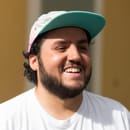With the internet being so easy to access, it has become easier for independent artists to find an audience and let their work be known. As a result, a variety of movements, collectives and scenes have found a way to share their work. The independent art scene in Puerto Rico is no different. Recently, a variety of artists from a variety of disciplines have found platforms that have made it easier for them to share their work. In addition, small businesses such as Electroshock in Santurce and Rio Piedras, bars like Off The Wall in Mayagüez, and libraries like La Casita Books and Gifts in Aguadilla, have provided up-and-coming artists a space for them to display their talents. “Puerto Rican Women Killing It in the Independent Art Scene” are interviews which provide a glimpse at a few of the women who are making their way in said movement. Though the artists were asked similar questions, some were asked queries focused specifically on their work.
Ketsia Ramos is a poet who works in the field of poetry, literature, and photography. Recently, she has taken an interest in drawing. She is also a member of Las Musas Descalzas and has been published in and out of Puerto Rico. This year, she will be published by Ediciones del Flamboyán. She has presented her work in a variety of spaces such as book stores, museums, universities, public plazas, and wherever else she feels comfortable. The following interview was conducted online.
(picture of Ramos)
How did you get into writing, especially poetry?
I reached poetry for political reasons, specifically the oppression provided by the capitalist-patriarchal system and the emotional instability that it causes. I started writing approximately in sixth grade because life was pressuring me and writing, at the moment, was my battle against death. In that sense, it is for me an act of political resistance.
I’ve seen your work is highly influenced by identity, politics, civil rights, and your passion for the arts. How did this happen?
On one side, due to the politics that introduced me to poetry, the disciplinary society in which we live in classifies me as a “supposed poor woman”, not white or countrywoman. So my formation as a person and artist, if you can call it that, is due to that which has been placed on my body, thus my work is a constant battle against those labels. Being that our body is our first space of resistance, I look to commit the simple political act of existing. On the other hand, more than a writer, I am a reader and learner. From there the poetry comes as a form of dialogue between the people that have come across me be they through print, spiritually, or personally. What I write I don’t create as an individual act, mine and original, it is collection, in common with other voices, as if to say comun-ista.
(the artist in a presentation)
How do you balance and/or mix poetry, photography, and academia?
To be honest, there’s no balance. The academy is another space of institutionalization and, as of now, I had a large dose of its elitism, abuse, and bureaucracy after taking my undergraduate studies, which is the same as saying “I faced this for four years and how they try to box our minds.” In the streets, mountains, backyards, and neighborhoods there’s an infinity of knowledge we can get into and that’s the space I wish to be in.
What do you think about the current state of the arts in Puerto Rico?
I can say a lot of things, but instead of saying, I’d rather question. What is our art being used for? Are these being manifestations of public art, imaginary urban spaces or public stunts? Is the work saying anything? Is this the voice of the popular voices? Or is it the lever used for community displacement? Or is it being used to beautify poverty and the misery in our urban spaces? I would rather question than provide an opinion on it.
(the artist in a presentation)
What do you think about the current state of the independent scene in Puerto Rico?
There are many people looking to transform Puerto Rican cultural panorama. Various collectives are taking into their hands what the Instituto de Cultura Puertorriqueña would do. At the same time, until recently hacer cultura (creating culture) was an hegemonized act which left various talents outside of the artistic-cultural spectrum because they didn’t have access to these circles. The emergence of these voices and organizations is due to the social, historical, and political context which has provided a “crisis” and the myth of scarcity. In fact, the popularity of these types of organizations and acts increased in the times where there was more mobilization. So I believe none of this has been a coincidence.
Is there any other form of art you wish to pursue? If so, what field and why?
I pursue the art of love. We have been taught how hate enough.
(Ramos in action)
If a young girl came up to you and said she wanted to be an artist, what would be your advice for her?
I would tell that person, without taking into consideration their age or sexual orientation, to never forget the societal responsibilities we all carry as people when we act and talk. As long as they don’t forget that, they will be one a good path.
What do you seek to achieve with your work?
As long as it serves as a form of cultural resistance and as societal link, it is sufficient. The prestige and recognition aren’t important.
(Ramos performing)
What is your biggest goal right now?
Be a societal link and be happy, those are my goals now and forever.
All of the pictures in this interview were provided by the artist


